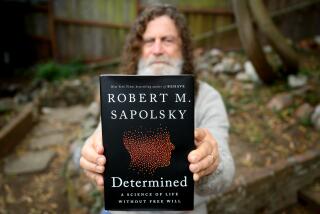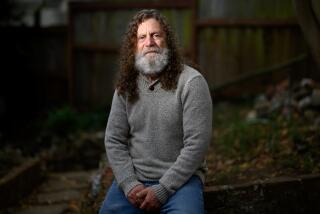Next Time You Pig Out, Blame It on the Genes
- Share via
Human behavior is endlessly fascinating to us humans, and scholarly research on the topic abounds. Our foibles, some scientists say, are rooted in our deep and distant past--in days long ago when Homo sapiens eked out tough livings in small tribes, gathering nuts and fruits and hunting game.
That past, the scholars reason, can explain all kinds of behaviors we exhibit today: why we like to drive fast cars; why men seem more prone to promiscuity than women; why women find men with symmetrical faces that much more dashing.
Probably the most famous books on the topic were written by Pulitzer Prize-winning Harvard biologist-author E.O. Wilson in the 1970s.
In hundreds of pages describing the antics of ants and other animals, Wilson reasoned that it made sense that behavior--just like limb shape or fur color--would influence survival and come to be embedded in our genes. Ants are one thing, but Wilson’s suggestion that human behavior was also rooted in genes outraged some scientists. On one occasion, a protester dumped a pitcher of water over him at a meeting.
Times have changed, and today the idea that genes influence our actions--without carving them in stone--is much more accepted.
Why do men worldwide seem to find curvy women attractive? Because, the scholars reason, women thus shaped are of childbearing age and not pregnant--at least yet.
Why so often is “blood thicker than water”? Because our kin share our genes--so we care more for their welfare.
And why do we pig out at buffets? Because like our Stone Age predecessors, we rely on a wide variety of foods for a balanced diet. We react the same way, say the scholars, when faced with 15 different kinds of canapes at a cocktail party.
How do we deal with this legacy--and make the best choices we can--when our genes are coaxing us to behave in less than stellar fashion? Here, the scholars are largely silent.
Not so economist Terry Burnham and geneticist Jay Phelan in their book “Mean Genes” (2000, Perseus Publishing), which is billed in a book blurb as a sort of Charles Darwin meets Dear Abby. The 252 pages are stuffed with Hints From Heloise-style tips for besting primal urges in love, friendship, leisure and work.
Phelan, 38, formerly of Harvard University and now a biology professor at UCLA, and Burnham, 41, a research scholar at Harvard , spoke with The Times’ Mestel about their book.
Question: What are “mean genes”?
Burnham: There’s this tension inside of all of us, stemming from how and where we evolved. We’ve got these genes that push us toward selfishness, fatty food, polygamy and more. And then we’ve got this other part of ourselves that’s saying, “I don’t want to be that way.”
Q: Why did you write “Mean Genes”? There are a lot of other books covering the evolutionary reasons for human behaviors.
Burnham: One big difference between our book and others--and there’s a zillion of ‘em--is we’re giving advice. We’re crossing the “should” barrier. More typically, you’ll have 600 pages of why you’re built the way you are and not one sentence on how this can make your life happier. What we do--using the lens of evolutionary biology--is sift through that haystack of advice that is out there already, to find the needle of the few things that are right.
Phelan: We’ve had people tell us: “I don’t need a couple of Harvard guys to tell me to eat before I go to the grocery store or give gifts to my wife.” Then we ask, do you give gifts to your wife? “No, but I don’t need a couple of Harvard guys to tell me.” Well, who should tell you?
Q: Give an example of a problem behavior that’s in “our nature” and how to deal with it.
Phelan: The problem of debt--which is related to our ancestral problems with food.
As humans, we evolved as hunter-gatherers in a world where food was limited. A good day was when you killed some big game. That meat was your insurance policy for the future. So you ate it as quickly as possible--before it went bad--perhaps sharing it with other people so they’d return the favor. In all our long evolutionary history, you saved for the future by storing your winnings as fat.
Fast-forward thousands of years. You’ve still got this brain that instinctively thinks: “When times are good, consume any surplus before it rots.” So today, when times are good, I get rewarded by a paycheck. And what do I do? Every paycheck--always--I spend every last cent.
Q: How do you get around that?
Phelan: The trick is understanding I’m going to want to consume it, and my willpower will never be very good at resisting. So I need to think my check is smaller than it is. In one big moment of willpower, when I tell them how much money to take out of my paycheck, I tell them: “Take a bunch of extra money out every month. Send it somewhere I can’t see it.” I still have these instincts to consume, and I still spend all my check. But I’ve got this other stuff accumulating that I don’t really view as my money.
Burnham: It sounds trite. But average Americans only save by this mechanism. When they retire, they have three pools of wealth: Social Security, retirement accounts and houses--all situations where money is taken upfront.
Q: Give me another example.
Burnham: Giving gifts.
What do gifts have to do with evolutionary biology? Well, mutual cooperation between people who aren’t related is really useful. I give you something today, you repay me later. There are good days and bad days for every animal, so this should be great. But it’s really rare in the animal world. The reason: It’s too easy to get exploited. Evolution is harsh. Cheat me just a little bit, and, over many generations, I become extinct.
Human beings have solved the problem. Our brains create powerful emotions that say [if someone gives you a gift]: “Oohh! That’s warm!” and induce you to give back. But when you’re wronged, you can have vicious, outraged feelings.
Phelan: And humans are spectacularly good at keeping track of hundreds of people and knowing where the balance of favors stand. Think of the friends you eat out with. Do you know which ones come up short when you’re paying the bill? I can think of those people right now.
Burnham: The cheapskates.
Nowadays, we have legal contracts to cover really big favors--like money loans--but our instincts are still there. And they’re powerful. So my rule is: Give a gift a day. You get more from life if you use them as a tool to make people feel good about you or beholden. But the other thing is--you’re just happier. Imagine two relationships. In one, no one gives gifts. The net flow of altruism or wealth is neutral. In the other, you exchange lots of gifts. It’s still neutral, right? But which one do you feel better in?
Phelan: Unlike with the debt issue--where you’re trying to sidetrack your nature--here you’re trying to embrace it.
Another area where our genetic urges need to be managed is risk-taking. Humans are built to like a level of risk. After all, we evolved in Africa and someone had to leave cozy, successful Africa and say: “I’m going to branch out and go where no one’s ever gone.” That person liked risk. The love of risk is in us--and both Terry and I have that taste. I love riding fast on motorcycles. And gambling. If you say, “Let’s go to Vegas,” I want to go. I see the roulette wheel--I get a charge, I want to play. But look at Vegas! All those beautiful hotels and casinos. They were built with my money!
So how can I satisfy my desire for risk but not lose my money? Well, Terry and I satisfy our risk lust with “credit card roulette.” At restaurants, when it’s time to pay, all the cards go into a hat and the waiter or waitress pulls one out--and the whole meal gets charged to that person. I love it. I get this big rush.
Burnham: I had a huge, devastating loss recently--$1,000.
Phelan: But if you do this often, over time--unlike Vegas--it evens out. You get the rush without any of the cost. Nothing gets siphoned off for the house.
Burnham: There are other kinds of risks our brains don’t like.
Phelan: Social risks.
Burnham: This makes sense. We’re built to take risks that were good for our ancestors, like hunting dangerous game--which could have great returns. Social risks are different. Imagine you’re one of 20 to 100 hunter-gatherers living together all your lives. Make a fool of yourself and everyone knows. They may just joke about it--”Oh, Rosie, she’s crazy”--but the consequences could be really bad. You could be ostracized. So our brains are designed to be scared of making bad impressions. Because “they’ll stay forever.”
Things are different now. You can take social risks--risk losing face--then walk out the door or get on a plane and go anywhere and no one will know what you did. The consequences, in today’sworld, are frequently quite low. So we should fight our instincts and take more social risks and career risks.
Q: Give a gift a day, payroll deduction and [from “Mean Genes”] hide the chocolate brownie behind a newspaper so you won’t eat it, keep unappetizing power bars in your office . . . aren’t these rather small and non-earth-shattering pieces of advice?
Burnham: These things may sound trite. But add them all up and they can have a powerful effect on your life.
Phelan: Race-car designers know that the easiest way to take off 100 pounds from a race car is to find a thousand places you can take off a 10th of a pound. That can make the difference between winning a race or losing it.






